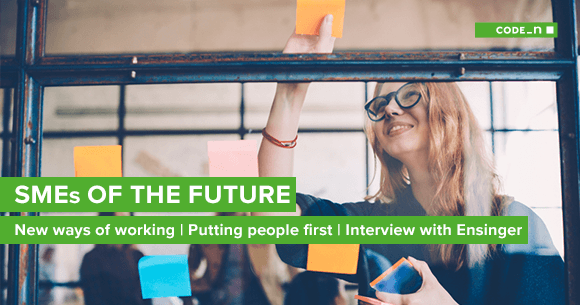DIRK BARANEK: “IT HAS TO WORK AND BE USABLE. ULTIMATELY, THE USERS DECIDE WHETHER IT’S GOING TO BE A BIG THING.”DIRK BARANEK: „FUNKTIONIEREN MUSS ES UND HANDHABBAR MUSS ES SEIN. OB ES ETWAS GROSSES WIRD, ENTSCHEIDEN LETZTLICH DIE NUTZER.“
In a digital conversation with Oliver Gassner, Dirk Baranek tells us how he feels about data collection on the web, what he likes about Google+, why he would even pay for Twitter, and what many startups do better in terms of PR than established companies.
 Oliver Gassner: Hello Dirk, would you please introduce yourself to our readers?
Oliver Gassner: Hello Dirk, would you please introduce yourself to our readers?
Dirk Baranek: I’ve been working on the web since 1997 as an online editor for publishing houses, as a concept developer for web agencies, a PR guy, and as a traditional local reporter for the Stuttgarter Zeitung. I’ve been a freelance online journalist (DJV) since 2005. Currently, I mainly help companies realize their communication on the web operationally – for example, as an editor of the LG blog, promoter for restaurant reviews, and online communicator for the Baden-Württemberg Social Democratic Party and EnBW AG.
OG: You write a lot about new apps on iPads and other innovative things. In your opinion, what is the biggest mistake that startups make in their PR?
DB: I think startups do a lot of things right that established companies get wrong. For example, they usually have blogs that report on the development of their products. I don’t know of any established company that really does that. Startups certainly can learn from traditional PR, though – especially with regard to form, and the understanding of what qualifies as a “news item”.
OG: Well, I got an email today from a startup, asking me whether I wouldn’t be interested in writing about their innovative platform on my “webblog” (sic) – only you can’t test it yet.
DB: Yeah, that’s stupid, of course. It sounds more like they’re fishing for links.
OG: Yeah.
Aside from your customers, which major company or startup has the best PR in the social web in your opinion?
DB: If I ask myself who I know – from a private perspective – I think Daimler does a lot of things really well. They are actually always present. Startups – well, Amen is not bad. The hype was huge, even though they didn’t really do anything.
OG: Personally, I don’t use Amen or get invitations to it, and I otherwise hardly ever read anything about it in blogs. With regard to Daimler: I thought the Zetzsche video for the launch of the Daimler G+ page was really cool. It may have been somewhat scripted had a lot of pitching, but it looked like it was shot from the hip, with background noise. But that’s totally wrong for such a quality-oriented company, isn’t it?
DB: On the topic of quality, for videos to work on the web, they need to be authentic. Nobody wants to watch polished agency stuff, unless it’s a really good gag, or elaborate or innovative. Users want to see real people on the web. They sometimes trip over their own tongues or hesitate, or the camera is a bit shaky, etc.
OG: The Daimler thing couldn’t have been realized that quickly through an agency. So, it’s quick and dirty or not at all. I think it’s probably the same for both of us: we come across new things on the web every day and ask ourselves, is that the new Twitter, or even the new Facebook? How can you tell that there’s more to a startup?
DB: In my opinion, you can’t. It has to work and be usable. Ultimately, the users decide whether it’s going to be a big thing. In the end, it’s a matter of mass: if nobody goes there, it fails. That’s why it’s extremely important at the beginning to address the right people personally.
OG: I also think it’s important that founders get to know their audiences. So, you can’t tell that something is going to be a success until it’s a success?
DB: I can’t think of any criteria otherwise. It’s all very random, arbitrary, and unpredictable. Maybe it should be shareable, but then which platform isn’t?
OG: Which new “thing” changed your mobile or web habits the most over the past 12 months?
DB: Well, I’ve added G+. I’m fairly active there, using it as a private blog for lack of another. Otherwise, there wasn’t really anything. Everything else is already older.
OG: And Twitter is what you use most, isn’t it?
DB: Yes, Twitter is still fantastic. I’m also on FB a lot, admittedly mostly for customers.
OG: What’s your take on what Twitter has been doing recently? I have the impression that now that Facebook has stolen all of Twitter’s good ideas, Twitter is “Facebookizing” itself.
DB: What exactly do you mean?
OG: The notifications tab, the fact that retweets are in my stream, the fact that anyone with a credit card can now book sponsored tweets.
DB: I always run the Twitter client and don’t see much of what they’re doing in the web application. Sure, they need to make money too, and I don’t have a problem with that. When such services are free, you can’t expect them to also be free of advertising. I would pay for Twitter, though. €5.00 per month – that would be ok. I also pay for Flickr, after all.
OG: If you were on the jury of a startup contest, what would you look for in a company to put it at the top of your list?
DB: Is it clear what the company is about? Do they avoid collecting data? Are the graphics a thing of beauty? Do they have a clever idea? Does the idea have the potential to earn money? (Anyone can burn through money…)
OG: Can web apps work at all without collecting data?
DB: That’s just what I mean: if a service works only when data is collected and sold – I assume anonymously, of course, but nevertheless – then I consider it flawed. The service should be designed so that users would pay for a perceived added value.
OG: I don’t know about you, but if I chose the paid option for every service I subscribe to, I’d probably be broke. Not everyone can last five years without cash flow, like Twitter. Is there such a thing as the ideal financing model for startups?
DB: I don’t see an ideal model. In my opinion, there are only two feasible ones: advertising and premium services.
OG: And people only click on ads if they’re targeted, and to target them, you have to collect data 😉 – it’s a vicious circle.
The prize for winning the CODE_n Global Innovation Contest is the opportunity to exhibit at CeBIT in a special CODE_n hall. If one of the winners were to book you as a PR expert, what would you do to generate buzz and ensure that journalists storm their booth?
DB: Depends on the topic, to be honest. At any rate, it’s essential to get things out of the digital space and into reality. In this era of electronic communication, real paper mail has taken on a completely different impact. Something could be done with that, I think. And the trick would be in getting it to refer back to the digital domain.
OG: How about dressing everyone up as Men in Black, Jedi, or storm troopers? Just a couple of ideas off the top of my head 😉
DB: Depends on how it fits to the product. It would be OK for games, but probably not for business networking 😉
OG: Oh, so like “Use the Force, Luke. Business Network ABC.” Actually, I have the impression that postal marketing would only work on handmade paper. Anything else goes straight into my bin. Do you open advertising mail?
DB: It depends. Personal letters, yes. And wooden crates, definitely! (I recently received one from a major manufacturer of alcoholic beverages.)
OG: And finally, a question about your personal preferences: iOS or Android, Google+ or Facebook? (In other words, not what you need to use because of your customers, but what feels cooler or objectively has a brighter future.)
DB: iOS and G+ for me personally. For customers: both systems and FB. Android is too frayed for my tastes and doesn’t fit to my hardware.
OG: When will G+ match or overtake FB in marketing?
DB: Hm, could be that it will never happen. G+ has an influence on Google Search, however. That will make it interesting for many companies. In doing so, Google has to be careful not to give up its neutrality.
OG: Thanks for the interview 😉
DB: OK, you’re welcome.Dirk Baranek erklärt im digitalen Gespräch mit Oliver Gassner, was er von der Datensammelei im Web hält, warum er gerne Google+ nutzt, für Twitter sogar bezahlen würde und was viele Startups in Sachen PR viel besser machen als erfahrene Unternehmen.
 Oliver Gassner: Hallo Dirk, würdest du dich sich unseren Lesern bitte kurz vorstellen?
Oliver Gassner: Hallo Dirk, würdest du dich sich unseren Lesern bitte kurz vorstellen?
Dirk Baranek: Im Web arbeite ich seit 1997 als Online-Redakteur bei Verlagen, als Konzeptioner bei Webagenturen, PR-Mann sowie klassisch als Lokaljournalist für die Stuttgarter Zeitung. Seit 2005 bin ich Freier Online-Journalist (DJV). Aktuell bin ich hauptsächlich für Unternehmen tätig, um deren Kommunikation im Web operativ umzusetzen. Zum Beispiel als Redakteur im LG-Blog, Promoter für Restaurant-Kritik und Online-Kommunikator für SPD Baden-Württemberg und die EnBW AG.
OG: Du schreibst ja viel über neue Apps auf iPads und andere innovative Dinge. Was ist aus deiner Sicht der größte Fehler, den Startups bei der PR machen?
DB: Startups machen meines Erachtens vieles richtig, was Unternehmen falsch machen. Z. B. gibt es zumeist einen Blog o.ä. in denen die Entwicklung des Produktes begleitet wird. Ich kenne kein Unternehmen, das sowas wirklich macht. Aber sicherlich können Startups bei klassischer PR dazulernen – was die Form betrifft zum Beispiel. Und beim Verständnis, was eine “Nachricht” sein könnte.
OG: Nun ja, ich hab heute zum Beispiel eine Mail von einem Startup bekommen, ob ich nicht in meinem „Webblog“ (sic!) über ihre innovative Plattform schreiben könnte – nur testen kann man die Plattform nicht.
DB: Ja, das ist natürlich dämlich. Das klingt eher nach Erhaschen von Links.
OG: Eben.
Wenn du von deinen Kunden absiehst: Welche große Firma oder welches Startup macht aus deiner Sicht die beste PR im Social Web?
DB: Wenn ich mich frage, wen ich überhaupt kenne, also aus privater Perspektive, macht Daimler meiner Meinung nach Vieles richtig gut. Die sind eigentlich überall immer dabei. Startups – nun ja, Amen hat das nicht schlecht gemacht. Der Hype war enorm, obwohl die eigentlich nix gemacht haben.
OG: Wobei ich Amen nicht nutze, keine Einladungen dazu kriege und auch sonst kaum was in Blogs dazu lese. Zu Daimler: Ich fand ja das Zetsche-Video zum Start der Daimler G+-Seite herrlich cool. Zwar etwas geskriptet und sehr viel plus-Stern-Gepitche, aber wie aus der Hüfte geschossen mit Hintergrundgeräuschen. Aber an sich ist das doch superfalsch für so nen Qualitätskonzern, oder?
DB: Zum Thema Qualität: Damit Videos im Web funktionieren, müssen die eben authentisch sein. Agenturpoliertes Zeugs will einfach niemand sehen, es sei denn es ist wirklich ein guter Gag oder aufwendig oder innovativ. Ansonsten wollen die Leute im Web echte Menschen sehen. Die versprechen sich, die machen Pausen, die Kamera wackelt etwas usw.
OG: Das Daimler-Ding wäre ja via Agentur gar nicht so schnell machbar gewesen. Also quick & dirty oder gar nicht. — Ich denk mal, dass es dir ähnlich geht wie mir: Täglich findet man im Web neue Sachen und denkt: Ist das jetzt das neue Twitter, oder gar das neue Facebook? Wie merkt man einem Startup an, dass da mehr drin steckt?
DB: Meines Erachtens gar nicht. Funktionieren muss es und handhabbar muss es sein. Ob es etwas Großes wird, entscheiden letztlich die Nutzer, die was daraus machen können. Letztlich ist das eine Massensache: Wenn niemand dort ist, fällt‘s eben durch. Daher ist es am Anfang enorm wichtig, die richtigen Leute persönlich anzusprechen.
OG: Ich finde auch wichtig, dass Gründer sich mit den Leuten beschäftigen, die sie ansprechen. Also: dass es ein Erfolg wird, merkt man erst, wenn es ein Erfolg wird?
DB: Mir fallen sonst keine Kriterien ein. Alles sehr zufällig, willkürlich, schwer berechenbar. Vielleicht sollte es shareable sein, aber welche Plattform ist das nicht?
OG: Welches neue “Ding” hat in den letzen 12 Monaten deine mobile oder Web-Gewohnheiten am meisten verändert?
DB: Gut, G+ ist dazugekommen. Ich bin dort recht aktiv, nutze es als Privatblog in Ermangelung eines anderen. Ansonsten war da eigentlich nix. Alles andere ist schon älter.
OG: Und am meisten nutzt du Twitter, oder was sonst?
DB: Ja, Twitter ist nach wie vor fantastisch. Ich bin aber auch viel auf FB, allerdings zumeist für Kunden, gebe ich zu.
OG: Ist das gut, was Twitter da gemacht hat kürzlich? Ich hab den Eindruck: nachdem Facebook alle guten Ideen von Twitter geklaut hat, “facebookisiert” sich jetzt Twitter.
DB: Was meinst du genau?
OG: Das Notifications-Tab, die Tatsache, dass in meinem Stream die Retweets drinstehen, die Tatsache, dass jeder mit einer Kreditkarte jetzt Sponsored Tweets buchen kann.
DB: Ich habe eh den Twitter-Client laufen und sehe vieles nicht, was die auf der Webanwendung machen. Klar, die müssen auch Geld verdienen, habe ich kein Problem damit. Man kann nicht davon ausgehen, wenn solche Dienste kostenlos sind, dass das dann auch noch werbefrei ist. Ich würde für Twitter allerdings auch bezahlen. 5 € /Monat – fände ich ok. Ich zahle ja auch für Flickr.
OG: Wenn Du in einer Jury für einen Gründerwettbewerb wärst: Wonach würdest Du bei einem Startup suchen, um es ganz oben auf die Votingliste zu setzen?
DB: Wird klar gemacht, worum es geht? Wird Datensammelei vermieden? Ist die Grafik “schön”? Gibt es eine clevere Idee? Hat die Idee auch Potenzial zum Geld verdienen? (Geld verbrennen kann jeder…)
OG: Funktionieren Web-Apps überhaupt ohne Datensammelei?
DB: Eben das meine ich: wenn der Dienst nur dann funktioniert, wenn Daten gesammelt und verkauft werden – klar anonym, davon gehe ich aus, aber trotzdem – dann halte ich das für verfehlt. Der Dienst sollte schon so gestaltet sein, dass Nutzer für einen erkennbaren Mehrwert bezahlen würden.
OG: Ich weiß nicht wie es dir geht, aber wenn ich bei jedem Dienst, der eine Bezahloption anbietet, ein Abo buche, wäre ich wahrscheinlich pleite. Nicht jeder hält ja fünf Jahre lang ohne Cashflow durch, wie Twitter. Gibt es sowas wie das ideale Finanzierungsmodell für Startups?
DB: Sehe ich nicht, das ideale Modell. Es gibt aber meiner Meinung nach nur zwei gangbare: Werbung und Premium Services.
OG: Und Werbung wird nur geklickt, wenn sie getargeted ist und um sie zu targeten muss man Daten sammeln 😉 – ein Teufelkskreis.
Der Preis für den Sieg bei CODE_n ist ein Ausstellungsplatz zusammen mit anderen Gewinnern auf der CeBIT in einer speziellen CODE_n-Halle. Wenn dich einer von denen als PRler bucht: Was denkst du dir aus, damit jeder über die spricht und die Journalisten den Stand stürmen?
DB: Kommt auf das Thema an ehrlich gesagt. Man müsste es jedenfalls irgendwie aus dem digitalen Raum in die Wirklichkeit kriegen. In Zeiten der elektronischen Kommunikation kriegen ja reale Postsendungen wieder einen ganz anderen Impact. Da geht wieder was, finde ich. Und das dann wieder auf die digitale Ebene zu beziehen, das wäre dann die Kunst.
OG: Oder alle verkleiden sich als Men in Black, Jediritter oder Stormtroopers? – Das fiel mir grad spontan ein 😉
DB: Muss man sehen, wie das zum Produkt passt. Bei Games sicher okay, bei Businessnetworking wohl eher nicht 😉
OG: Ach, so a la ‘Use the Force, Luke. Businessnetzwerk ABC.” – Also ich hab den Eindruck: Postmarketing funktioniert maximal noch auf Büttenpapier. Alles andere fliegt bei mir sofort in den Müll. Machst du deine Postwerbung auf?
DB: Kommt drauf an. Persönliche Briefe, ja. Und Holzkisten auf jeden Fall! (Neulich kam wieder was von einem großen Spirituosen-Hersteller)
OG: OK, ein Glaubensbekenntnis zum Schluss: iOS oder Android, Google+ oder Facebook? (Also nicht, was du aus Kundengründen musst, sondern was sich cooler anfühlt oder objektiv mehr Zukunft hat?)
DB: iOS und G+ für mich persönlich. Für Kunden: beide Systeme und FB. Android ist mir zu zerfasert, passt zudem nicht zu meiner Hardware.
OG: Wann überholt G+ FB beim Marketing oder zieht gleich?
DB: Hm, könnte sein, dass es nie passiert. Allerdings hat G+ Einfluss auf Google-Search. Das wird es für viele Unternehmen interessant machen. Wobei Google aufpassen muss, dass sie die Neutralität nicht aufgeben.
OG: Danke für das Gespräch 😉
DB: Ok, danke dir.






Write a comment